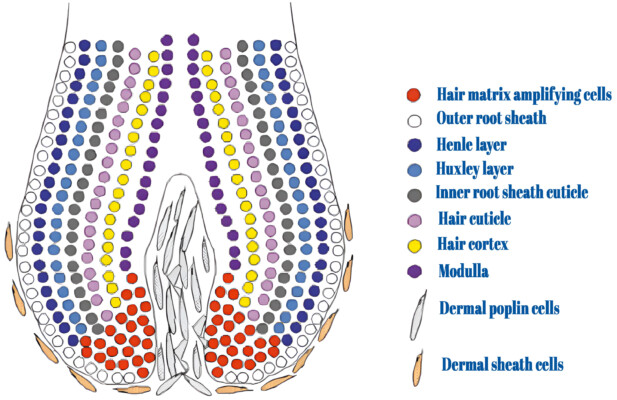Many people wonder how long it takes for their hair to grow, especially if they are trying to achieve a certain length or style. The answer is not simple, as hair growth depends on several factors, such as genetics, sex, age, nutrition, and stress levels. However, on average, hair tends to grow between 0.5 and 1.7 centimeters per month. This is equivalent to around 0.2–0.7 inches. It takes 2 to 6 years for each hair on your scalp to complete its growth cycle.
Hair growth rate: With a growth rate of 2.45 millimeters per week, hair grows about half an inch per month and approximately 6 inches per year. The features of hair, such as its length, density, color, and texture, are mainly determined by one’s genetics.
It take around 2-6 months for hair to grow 1 inch.
The stages of hair growth are the four phases that your hair follicles go through as they produce, rest, and shed hairs. The hair growth cycle is the process by which the hair follicle produces, sheds, and replaces a hair strand. It consists of four stages: anagen, catagen, telogen, and exogen.
- Anagen is the active growth phase, when the hair cells divide rapidly and the hair shaft grows longer. This phase lasts for 2 to 8 years, depending on the individual and the type of hair.
- Catagen is the transition phase, when the hair follicle shrinks and detaches from the blood supply and the hair root. This phase lasts for about 10 days and signals the end of the anagen phase.
- Telogen is the resting phase, when the hair follicle remains dormant and the hair strand is still attached to the follicle but not growing. This phase lasts for about 3 months and accounts for 10 to 15 percent of the scalp hairs at any given time.
- Exogen is the shedding phase, when the old hair strand falls out and a new hair strand begins to grow from the same follicle. This phase occurs simultaneously with the anagen phase of the new hair strand. On average, 50 to 100 hairs are shed per day during this phase.
The hair growth cycle is influenced by many factors, such as genetics, nutrition, health, age, sex, stress, and hair care. Understanding the hair growth cycle can help you maintain healthy hair and prevent or treat hair loss.

These stages repeat throughout your life, but they can be disrupted by factors such as stress, illness, medication, diet, or hormonal changes. The rate of hair growth varies from person to person and can be influenced by various factors. Some of these factors are:
Here are 10 of the most important factors that affect hair growth:
- 1. Genetics: This is a big one. If hair loss runs in your family, you’re more likely to experience it yourself. This is because certain genes can influence the sensitivity of hair follicles to hormones like testosterone, affecting the hair growth cycle.
- 2. Hormones: Fluctuations in hormones, especially testosterone and estrogen, can significantly impact hair growth. This is why hair loss is common during times of hormonal change like puberty, pregnancy, menopause, and thyroid disorders.
- 3. Nutrition: Hair follicles need adequate nutrients like protein, iron, zinc, biotin, and vitamins A, C, and D to function properly. Deficiencies in any of these nutrients can lead to hair loss or slowed growth.
- 4. Stress: Chronic stress can disrupt the hair growth cycle and trigger temporary or even permanent hair loss. This is because stress hormones can affect the blood flow to the scalp and impair the functioning of hair follicles.
- 5. Scalp health: Conditions like dandruff, seborrheic dermatitis, and psoriasis can create an unhealthy environment for hair growth. Scalp infections or inflammation can also damage hair follicles and lead to hair loss.
- 6. Medical conditions: Certain medical conditions like autoimmune diseases, alopecia areata, and anemia can cause hair loss. Medications for some conditions, like chemotherapy drugs, can also have this effect.
- 7. Ageing: As we age, our hair follicles naturally become less active and produce hair at a slower rate. This is why most people experience some degree of hair thinning and loss as they get older.
- 8. Hairstyles and hair care practices: Tight hairstyles, harsh chemicals, excessive heat styling, and over-washing can damage hair and lead to breakage or even hair loss. Learn how often you should wash your hair to avoid these issues.
- 9. Environmental factors: Exposure to pollutants, UV radiation, and extreme weather conditions can all contribute to hair damage and slowed growth.
- 10. Individual differences: Everyone’s hair is unique, and some people are simply more prone to hair loss than others. This can be due to a combination of genetic, environmental, and lifestyle factors.
If you want to make your hair grow faster and stronger, you might want to try some of the following tips:
- Eat a balanced diet that includes protein, iron, zinc, and biotin.
- Avoid heat styling, chemical treatments, and harsh brushing.
- Massage your scalp to stimulate blood flow and hair follicles.
- Trim your hair regularly to prevent split ends and breakage.
- Use gentle shampoo and conditioner that suit your hair type.
- Protect your hair from sun damage and pollution.
Summary:
Hair growth varies from person to person, but on average, hair grows about half an inch per month. This means it typically takes around two months for hair to grow an inch. After a haircut, it could take several years for hair to grow back to its original length, especially if the hair was cut very short. When it comes to shaving, hair usually starts to regrow within two to four weeks. After chemotherapy, hair usually starts to regrow within 4–6 weeks after finishing treatment.
Frequently Asked Questions
+how long does it take hair to grow with biotin?
Biotin, a water-soluble B vitamin, is often found in hair growth supplements and hair care products. It plays a crucial role in converting food into energy and is needed for the production of keratin, a type of protein that makes up hair, skin, and nails.
However, the effectiveness of biotin in promoting hair growth is not well-established. While biotin may support hair growth in people with a biotin deficiency, there’s limited evidence to suggest that supplementing with biotin promotes hair growth in non-deficient people.
In a 2012 study, women with self-perceived thinning hair who received a multi-ingredient hair growth supplement (that included biotin) reported a visible increase in overall hair volume, scalp coverage, and thickness after six months. However, the study’s findings cannot be attributed to biotin alone as the supplement contained multiple ingredients.
It’s important to note that most people get adequate amounts of biotin from their diet and the bacteria in their gut. Therefore, additional supplementation may not be necessary unless a person has a biotin deficiency or is pregnant.
